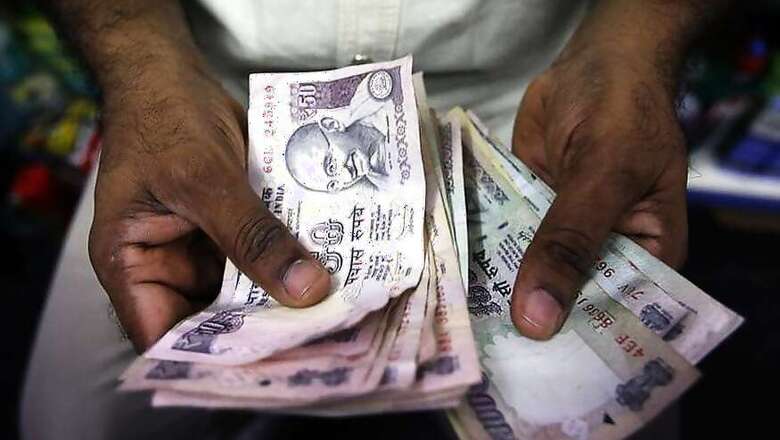
views
Guwahati: After recording a sharp drop during coronavirus lockdown, extortion is back on the rise in Nagaland. The earlier drop in ‘additional taxation’ and extortion cases in first three months of lockdown was attributed to cadres of various National Socialist Council of Nagaland (NSCN) factions remaining home or returning to their villages. During the lockdown, those staying in the camps were running out of ration and medical facilities, while others faced restriction in movement due to want of transit passes. But as the state gradually reopened in June, extortion activities returned to pre-lockdown levels.
“For the first two months of lockdown, they were unable to collect taxes. Now, with restrictions being lifted and shops reopening, they have resorted to illegal collection – collecting taxes from every business, particularly transport. We request the government to take immediate action as people are suffering,” said Vekhosayi Nyekha, Media Convenor of the People’s Action Committee (PAC), Nagaland.
“They are also moving freely with arms. I request the Chairman of Ceasefire Monitoring Group to intervene in this aspect,” Nyekha added.
The civil society groups, interestingly, found strong support in a letter written by Nagaland Governor RN Ravi to Chief Minister Neiphiu Rio on June 16, in which he slammed the state machinery for failing to address growing concerns. The Governor wrote, “Civil society organizations, at great personal risk to their members, have been raising voices, from time to time, against such blatant unlawful activities of the armed gangs. I have received several representations of public for intervention and relief because the state law and order machinery does not act.”
In his four-page letter to the Chief Minister, Governor Ravi observed how “day to day unrestrained depredations by over half a dozen organized armed gangs, brazenly running their respective so called ‘Government’, challenging the legitimacy of the state government without any resistance from the state law and order machinery has created a crisis of confidence in the system.”
“Situation has deteriorated to such an extent that the armed miscreants appoint their own ‘dealers’ for every commodity from salt to construction materials coming into the state. They decide and levy illegal ‘taxes’ on every item. They run ‘syndicates’, for contrabands including alcoholic drinks which they help smuggle into the state. They are operating check gates for this purpose at almost every entry point to the state with the full knowledge of the state law and order machinery,” the Governor mentioned in his letter, stating that he has been “closely observing the precarious law and order situation in the state with a lot of concern since August 2019” when he assumed office as the Governor of Nagaland.
In the backdrop of the “grim scenario and collapse of law and order”, Governor RN Ravi proposed through his letter that he would periodically review the law and order in the state and issue “required lawful directions”.
The Dimapur Chamber of Commerce and Industry (DCCI) had also expressed concern over some of the Naga National Political Groups (NNPGs) and other elements forcefully collecting tax from shops and business establishments.
“They have resorted to ‘item-wise’ taxation – for example, if there are different brands of biscuits and noodles in a shop, they want to collect tax for every item under separate brands. I want government to give us protection and settle this problem of taxation,” said DCCI President Akashe Zhimomi, adding that he has not come across anyone moving around with arms and collecting taxes.
Zhimomi also appreciated the Governor writing to Chief Minister Rio about the problem.
“It is really good that the Governor wrote to the CM. The state government is expected to come out and do its job. They are simply sleeping. Today, taking all the risk, we have come out to speak about this issue. We have no other option,” he remarked.
Sources said the groups are collecting anywhere between Rs 1,000 to Rs 1 lakh a day, and Rs 3,000 to Rs 7,000 from every passenger vehicle, depending on the carrying capacity.
In May and June, several cadres of various NSCN factions were apprehended in Arunachal Pradesh and Assam under charges of extortion and illegal recruitment activities. On May 21, police had arrested a member of NSCN-Unification in connection with a ‘forced taxation demand’ served to the proprietor of Progressive Motors at Darogapathar village in Dimapur. The GPRN/NSCN had regretted it as an ‘unfortunate development’ and constituted a ‘high powered committee’ to discuss the matter within their organization and other groups. It was later ‘amicably resolved and declared null and void’.
Earlier, speaking to this correspondent, a senior leader of NSCN-Neopao Konyak/Kitovi (NSCN/NK also known as GPRN/NSCN) had expressed solidarity with people affected by lockdown.
“When you are in lockdown, you are not in a position to earn. We need to understand the situation. The lockdown has affected people and livelihoods. Only half the shops are open, nothing is functioning regularly. Under such conditions, how can we send our men to seek donations or collect taxes?” said the senior NSCN/NK leader on condition of anonymity.
A defence analyst in Nagaland, however, said that “extortion figures during lockdown stood at about 20 per cent, and that the year 2020 has been the safest in the state since last two decades.”














Comments
0 comment